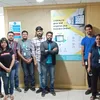Using KBC-like polls, this edtech startup helps teachers map students' learning
PiCards, the flagship product of Bengaluru-based edtech startup 22bate7, helps engage students in classrooms through quick polls.
When Abhinav Tripathi was working as an intern at Microsoft Research India’s ‘Technology for Emerging Markets’ group, he found that classroom-polling helped improve learning outcomes. After he finished his internship, he continued to do similar work – also with Microsoft, supporting the group pilot more such studies.
“When Pearson India approached Microsoft for a pilot, we realised there was a gap in the existing edtech scene, where a lot of players were taking online assessments but were hardly focussing on aiding teachers or tracking students' progress in the classroom,” says Abhinav.
Classrooms had smartboards and similar technologies, but they largely relied on one-way knowledge delivery, were costly, and not affordable for everyone.
This led to the birth of 22bate7, which Abhinav co-founded with his batchmates Nilesh Suthar and Anuj Kosambi, at the Dhirubhai Ambani Institute of Information and Communication Technology (DA-IICT) in February 2017.
Based out of Bengaluru, the startup is currently incubated at Social Alpha – a Tata Trusts initiative for social enterprises.

Founders of PiCards
22bate7 markets itself as a startup that helps improve learning outcomes in classrooms, through its affordable technological solution. Its flagship product – PiCards – helps engage students through quick polls, without needing any electronic devices. It also helps teachers in quickly assessing comprehension levels in the classroom, and addressing learning gaps immediately.
“We decided to build a solution that could easily engage students, bring interactivity to any class and also track students’ progress without putting any pressure on them. As we continued working in this sector, we realised that our solution did not just have a use-case in schools, directly, but it also had application in the NGO space, and so, we tweaked our offerings to serve that use case as well,” says Abhinav.
How does the product work?
“We started with a simple tool to helps teachers conduct quick polls in classrooms, without requiring any electronic devices for the students. Clicker devices – like the ones used in Kaun Banega Crorepati for the audience polling lifeline, are widely used in American universities to drive engagement and assess comprehension levels,” says Abhinav.
Through their research, they found that this continuous feedback helped improve learning outcomes.
The three decided to base their data collection on that model, but instead of devices, they created response cards, which had unique QR code-like patterns printed on them.
These cards – printable on normal A4 sheets – rotate 4X4 in different orientations, and these orientations become options A, B, C and D.
The process begins with the teacher asking a question in class. The students respond to the question by rotating their cards and holding them up towards the teacher’s phone, which has a special scanning app, designed by the company, running on it.
The scanner, with its ability to run through multiple cards, records the classroom’s response within 15 to 20 seconds, and lets the teacher know how many students, and who, picked each answer. It also tells the teacher the percentage of correct answers, and wrong.
All this data can be used by the teacher to revisit his or her lesson plan. For example, if several students get the same answer wrong, the teacher can conclude that the topic being taught was not understood by students properly, and address that learning gap immediately.
Further, these questions can also be tagged to topics and used to track individual students’ performance. “For example, if a teacher asks three addition questions, and some students get it wrong twice, we’ll be able to identify that those kids are struggling in the addition topic,” says Abhinav.
The software tracks each student’s progress in the classroom, and highlights their weak and strong areas, even before they write an exam on that topic or subject. All that is done so the student, their parents, and the teacher can pay special attention to those topics or subjects.

What does it do?
Apart from helping schools directly, PiCards can help NGOs, as well, in greatly reducing data collection, evaluation and analysis efforts.
Wherever NGOs need to collect responses to multiple choice questions from a group of individuals – be it in classrooms, self-help group meetings, impact assessment groups, etc – PiCards can used to poll the participants.
The digitally-captured responses, combined with the company’s smart software, can help provide NGOs detailed, automated evaluation and analysis reports, even for data collected from the remotest parts of the country.
In essence, and at least for NGOs, PiCards can prove to be an automated data collection and analytics platform, while for schools, it is an assessment and a performance-tracking tool.
But those are just the very basic functions of the software; value-addition is the next level, explains Abhinav.
“For NGOs, there are additional features to cater to their reporting and analysis requirement. The PiCards Dashboard for NGOs gives them a complete solution where they can create programs, projects, add/assign donors, manage teachers/participants, and so on. The reporting platform gives them the flexibility to generate custom reports, and we have standard deviation, correlation and T-Tests checks also built-in to make sure that the data is statistically significant and correct,” he explains.
Schools also can also use their phone-based OMR scanner feature to conduct Olympiad-styled tests, or use the platform’s exam analysis module to analyse students’ performance in subjective exams.
PiCards analytics provides several levels of reporting for teachers, school admins, super admins, and parents through separate apps and dashboards. The setup can also be used for quick attendance in classrooms, and parents can be notified of it on their apps.
Apart from all that, PiCards can also provide SDK licenses to other smart-classroom players if they are able to integrate the company’s scanning feature in their own solution.
Proving their mettle, and their monetisation model
When the three 26-year olds started marketing their solution around, they were met with scepticism. Most wondered how teachers would understand the concept of ‘scanning’, or how students would understand the process of indicating their responses.
“They also had doubts around how accurate our technology will be, and how will it perform in low resource settings. We were unfazed by all these as we had been continuously improving our product, based on the feedback from real users from our pilots with Teach70, Pearson India, Teach For India and other organisations,” explains Abhinav.
Based on the feedback from initial users, they decided to make the product as easy to use as possible.
To monetise their product, the company decided to charge schools a per student, per year fee, which varied depending on the size of the school, features offered and the number of students enrolled. For NGOs, the cost depended on how frequently the platform was used.
For SDKs, the company charges a fixed yearly licensing fee between Rs 2 lakh to Rs 5 lakh, depending on the reach of the organisations.
PiCards has the potential to create a disruptive, social impact, says Srikanth Prabhu, EdTech Lead at Social Alpha, adding technology and data are two ingredients necessary to improve the quality of education.
“We believe data-driven decision making is the critical need to impact quality of learning outcomes. In this context, PiCards offers a simple, affordable yet effective solution that works in low resource settings, without internet and on any smartphone of the teacher,” he says.
The edtech market
Despite 1,150 edtech startups out of 4,450 shutting shop between 2014 and 2019, e-learning and related solutions is a market worth $2 billion, a Datalabs report says.
With digitisation becoming ingrained in the fabric of the Indian society, online education is gaining traction in the current market, especially given the COVID-19 scenario. Well-funded Indian startups in this space include Byju’s, Unacademy, Toppr, and Vedantu, and amidst these giants, PiCards seems to hold its own.
The company reported an annual turnover of Rs 60 lakh for FY19, and said it has worked with 30 schools directly, over the last 18 months since launching the product.
It has engaged with major NGOs, including Agastya International foundation, and Piramal Foundation, and onboarded over three lakh students.
Currently, the startup has over 2.5 lakh questions, 8,000 feedbacks, 21,000 attendance, 22,000 classes, and six million question responses in its bank.
The startup said it expects to reach a hundred schools this year, and, along with NGOs, serve at least a million kids. In the next three years, PiCards will serve over five million students, it added.
“We will also be exploring synergies with coaching institutes to expand further. The idea is to make PiCards a ubiquitous solution for any kinds of assessments and analysis,” says Abhinav.
Edited by Aparajita Saxena










